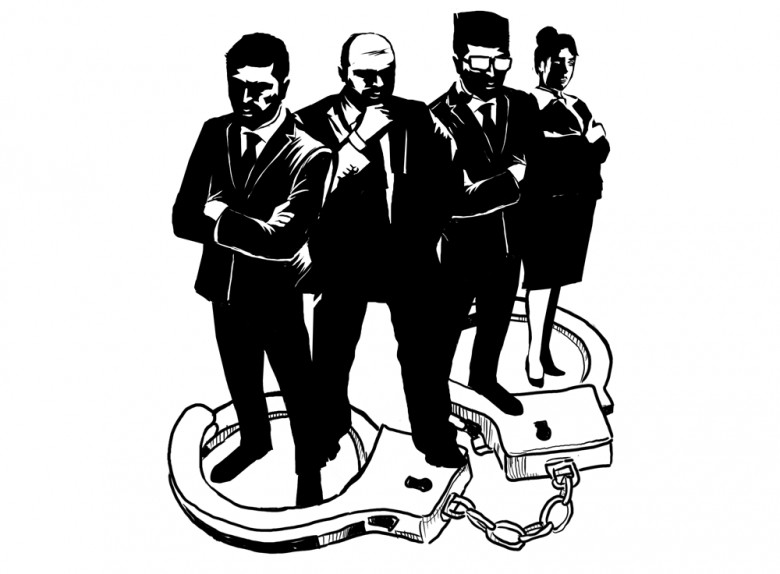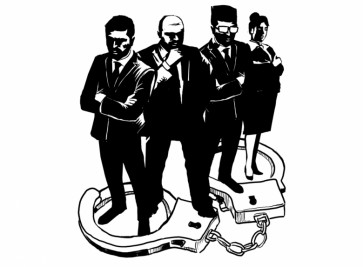Popular Reads
Top Results
Can't find what you're looking for?
View all search resultsPopular Reads
Top Results
Can't find what you're looking for?
View all search resultsEconomics of corruption: How dismal science can explain graft problem
Economics can help explain the reasons behind this corruption, specifically game theory and behavioral economics. Game theory analyzes situations in which the strategic actions of one agent affect the payoff of another. Behavioral economics analyzes economic decisions using psychological insights about individual behavior.
Change text size
Gift Premium Articles
to Anyone
 Economics can help explain the reasons behind this corruption, specifically game theory and behavioral economics. Game theory analyzes situations in which the strategic actions of one agent affect the payoff of another. Behavioral economics analyzes economic decisions using psychological insights about individual behavior. (JP/Budhi Button)
Economics can help explain the reasons behind this corruption, specifically game theory and behavioral economics. Game theory analyzes situations in which the strategic actions of one agent affect the payoff of another. Behavioral economics analyzes economic decisions using psychological insights about individual behavior. (JP/Budhi Button)
T
he controversial revision to Law No. 30/2002 on the Corruption Eradication Commission (KPK) has not had a visible effect on either the KPK or the criminals it pursues. The KPK continues to operate while some, in both the public and private sectors, keep conspiring in corruption.
Three recent cases included the arrests of the regent of Indramayu, West Java, on Oct. 15, of the Medan mayor in North Sumatra and of the head of the regional road authority (BPJW) in Samarinda, East Kalimantan. The first and third were arrested in relation to alleged bribery in public road procurement, while the second has been implicated in a series of illegal cash gifts from the local government office. Since 2004, 122 regional heads have been detained by the KPK and have been named suspects in corruption cases. They make up only a fraction of graft cases in Indonesia.
Economics can help explain the reasons behind this corruption, specifically game theory and behavioral economics. Game theory analyzes situations in which the strategic actions of one agent affect the payoff of another. Behavioral economics analyzes economic decisions using psychological insights about individual behavior.
One “game” studied in game theory is the prisoners’ dilemma. Imagine that two prisoners, each held in isolation, may either confess to a crime or remain silent. If both prisoners betray each other, they both serve two years in prison. If one prisoner betrays the other and the other remains silent, the betraying prisoner will be set free and the other will serve three years in prison (and vice versa). If both remain silent, they will serve only one year in prison. Thus mutual cooperation (confessing nothing) gives a higher payoff than mutual defection (betraying each other), but the best payoff for an individual prisoner comes from betraying while the other tries to cooperate. The lowest shared payoff results from trying to cooperate with the betraying prisoner.
Similarly, corrupt individuals act in their own self-interest. This does not result in an optimal payoff for society — that is, a world without corruption. Yet no one person can govern how others will behave. If someone chooses not to engage in corruption while others flout the rules freely, he or she loses.
Indonesia has been trying to stamp out graft since the 1971 law on corruption eradication. Several anticorruption teams and initiatives have been established. Yet chronic corruption — plus rampant collusion and nepotism — has continued. It contributed to the 1997/98 economic and political crisis which led to the fall of the New Order authoritarian regime. Now, 17 years after the enforcement of the KPK law, Indonesia’s democracy is still trapped in the prisoners dilemma of self-interest and corruption.
Threats of legal penalties for corruption, including imprisonment, have not yet created a sufficient deterrent. Under game theory, a threat tries to change another person’s behavior to align with the threat makers goals. For a threat to be credible, it should be carried out whenever the conditions of the threat are met. Such threats are fulfilled in Indonesia as evidenced by hundreds of corrupt actors sent to prison. Still, corruption continues.

















